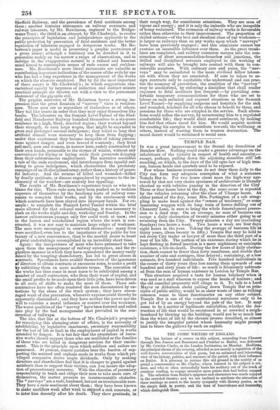TEMPLE BAR.
IT was a great improvement to the Strand the demolition of Butcher Row. Nothing could confer a greater advantage on the inhabitants of the vicinity in respect of health and amenity,— except, perhaps, pulling down the adjoining shambles still left standing, on which, in the days of the old ogre-law of high trea- son, human heads and quarters used to be exposed. Few whose business avocations do not draw them daily to the City can form any adequate conception of what a nuisance Temple Bar is. For two hours about noon the high-way nar- rowed by that not very choice specimen of architecture is literally chocked up with vehicles passing in the direction of the City Three or four hours later in the day, the same scene is repeated by the vehicles returning after the close of 'Change hours. At either period of the day, some Mrs. Partington of a cab strug- gling to make head against the "stream of tendency," or some lumbering waggon with its long train of horses defiling out of Chancery Lane, is sure to bring the whole funeral-paced proces- sion to a dead stop. On an average, no man of business can escape a daily obstruction of twenty minutes either going to-or returning from the City. Twenty minutes a day are (excluding Sundays) two hours a week. Two hours a week are four days eight hours in the year. Taking the average of business life at thirty years, (from twenty to fifty,) Temple Bar may be held to rob every City trader or lawyer of more than the third part of a year of his life. The portion of his existence during which he is kept fretting in forced inaction is a mere nightmare or cataleptic existence, a life-in-death. During the few hours of daily obstruc- tion, there cannot be fewer than forty omnibuses, and double that number of cabs and carriages, thus delayed ; containing, at a low estimate, five hundred individuals. Five hundred individuals in the course of thirty years thus lose among them upwards of one hundred and sixty years of life : so much is feloniously subtract- ed from the sum of human existence in London by Temple Bar. This structure acquired a taste for human butchery when it was used as a stall whereon to expose the heads of traitors; and the old cannibal propensity still clings to it. To talk to aLord Mayor or Alderman about pulling down Temple Bar onprin- ciples of public utility-, would be as sheer waste of time as talking common sense to those functionaries on any other subject. Temple Bar is one of the constitutional nuisances only to be got rid of by an energy beyond the pale of the law. It may come to be a matter of legitimate calculation, whether the des- truction of life that would be occasioned in so crowded a neigh- bourhood by blowing up the building, would not be so much less than the waste of life by the chronic process described, as almost to justify the irregular patriot whose humanity might prompt him to brave the gallows by such an exploit.


























 Previous page
Previous page